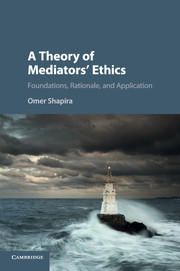Book contents
- Frontmatter
- Dedication
- Contents
- List of figures
- List of tables
- Preface
- Abbreviations of codes of conduct
- PART I A theory of professional ethics
- PART II A theory of mediators’ ethics
- 3 Mediation, mediators’ role, and mediators’ ethics
- 4 Party self-determination
- 5 Mediator competence
- 6 Conflicts of interest
- 7 Mediator impartiality
- 8 Professional integrity
- 9 Diligence, respect and dignity, and honesty
- 10 Confidentiality
- 11 Fairness
- 12 Maintaining the profession's standing and advancement of the profession
- 13 Advertising, solicitation, and mediator fees
- 14 Obligations to employers and principals
- PART III Dealing with ethical problems
- Appendix I A proposed model code of conduct for mediators
- Appendix II Model standards of conduct for mediators (2005)
- Bibliography
- Index
7 - Mediator impartiality
from PART II - A theory of mediators’ ethics
Published online by Cambridge University Press: 05 March 2016
- Frontmatter
- Dedication
- Contents
- List of figures
- List of tables
- Preface
- Abbreviations of codes of conduct
- PART I A theory of professional ethics
- PART II A theory of mediators’ ethics
- 3 Mediation, mediators’ role, and mediators’ ethics
- 4 Party self-determination
- 5 Mediator competence
- 6 Conflicts of interest
- 7 Mediator impartiality
- 8 Professional integrity
- 9 Diligence, respect and dignity, and honesty
- 10 Confidentiality
- 11 Fairness
- 12 Maintaining the profession's standing and advancement of the profession
- 13 Advertising, solicitation, and mediator fees
- 14 Obligations to employers and principals
- PART III Dealing with ethical problems
- Appendix I A proposed model code of conduct for mediators
- Appendix II Model standards of conduct for mediators (2005)
- Bibliography
- Index
Summary
Introduction
The obligation of mediators to conduct mediations impartially can be found in virtually every code of conduct for mediators. Most mediation scholars agree on the importance and centrality of impartiality to the theory and practice of mediation, although some – especially transformative and narrative mediation experts – are skeptical of the possibility of ever achieving impartiality in real practice. Some practitioners use the term “neutrality” interchangeably with impartiality, but neutrality is hardly used these days as a standard in codes of conduct for mediators. The problem with the neutrality discourse is that it is not refined enough and leaves uncertainty as to the intentions of those who make statements on the neutrality of mediators. In fact, the meaning of neutrality in the context of mediation encompasses both mediator impartiality and the obligations of mediators in connection with conflicts of interest. When a mediator's neutrality is questioned, it could mean that the mediator acted with partiality, i.e., that he or she favored one party over another, or that he was not acting disinterestedly, i.e., that he or she had an interest in the process or outcome in conflict with an interest of one or more parties. Each of these statements has a different meaning that should be appreciated and fully understood by mediators. Thus, impartiality and conflict of interests are dealt with separately in this book, and these terms are preferred to neutrality.
Understanding the meaning of impartiality is a key to the ethical practice of mediation. Impartiality has become so intertwined with the public image of mediation that mediators acting impartially in the exercise of their role can be considered a professional undertaking. The exact limits of this norm, however, are uncertain, not only because of different suggested definitions of impartiality, but also because of the tension between impartiality and other recognized norms of conduct applicable to mediators, in particular the obligation to conduct a process that respects party self-determination. This chapter explores the normative sources of mediators’ ethical duty of impartiality, ascertains its meaning, and suggests how it can be reconciled with other norms that are binding on mediators.
The sources of mediators’ duty of impartiality
The reasonable expectations of mediation parties
The reasonable expectations of mediation parties are constructed upon (a) the common standards of mediation practice, and (b) the relationship of trust between parties and mediators.
- Type
- Chapter
- Information
- A Theory of Mediators' EthicsFoundations, Rationale, and Application, pp. 207 - 230Publisher: Cambridge University PressPrint publication year: 2016



